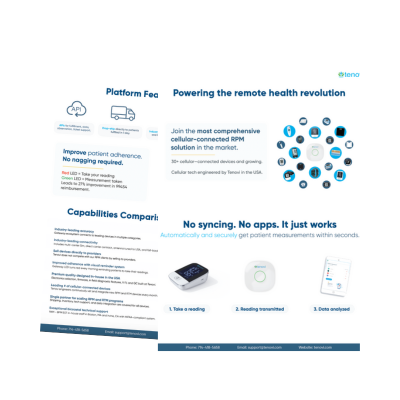Remote respiratory monitoring technologies are gaining recognition for their potential to address the management of respiratory diseases such as asthma, chronic obstructive pulmonary disease (COPD), and respiratory infections, impacting hundreds of millions globally. Respiratory diseases such as asthma, chronic obstructive pulmonary disease (COPD), and respiratory infections impact hundreds of millions of people globally. Over 262 million people worldwide have asthma. COPD alone is the third leading cause of death globally, with 300 million diagnosed cases.
Patients with respiratory conditions often struggle to manage sudden symptoms that can worsen unexpectedly. This is where remote respiratory monitoring with remote therapeutic monitoring technologies can play a crucial role. Devices such as smart inhalers and smart pillboxes enable continuous, personalized monitoring that can detect early signs of worsening conditions, allowing for more proactive management.
Respiratory Disease Burdens and Remote Respiratory Monitoring as A Potential Solution
Beyond mortality, they reduce quality of life and create economic costs for healthcare systems. The economic costs associated with chronic respiratory conditions are also tremendous. For example, the annual medical costs related to COPD in the U.S. alone is 24 billion. That is $4322 per patient yearly.
Beyond this data, these diseases severely impact the quality of life with unpredictable, distressing attacks for those afflicted when symptoms rapidly worsen. The unpredictable, rapid changes these diseases undergo are poorly suited to periodic, scheduled doctor appointments.
Respiratory patients’ unique vulnerabilities and challenges make them an ideal population to benefit from remote respiratory monitoring technologies. With many needing better solutions, researchers are devoting more attention to studying how new digital health tools can improve respiratory care over the long term.
A study published in The Lancet Digital Health highlights the importance of remote respiratory monitoring digital health technologies like wearables, smart inhalers, and air quality sensors that could greatly benefit people with respiratory conditions.
Research in Remote Respiratory Monitoring
Many RPM technologies allow for personalized, continuous remote respiratory monitoring to detect early signs of worsening symptoms. The article provides the example of a fictional patient, Lynnae, a 37-year-old woman with difficult-to-control asthma requiring hospitalization 3-4 times per year.
By tracking her rescue inhaler use with a connected device, her doctor identified increases in poor air quality and helped Lynnae install air filters at home. The study suggests these changes could reduce her inhaler use by 78% and improve symptom-free days by 48%.
New Technologies Offer Continuous Remote Respiratory Monitoring
Consumer wearables like smartwatches now have medical-grade sensors to track vital signs. Specialized items like smart inhalers record medication use. In addition, remote respiratory monitoring with a peak flow meter sends daily readings to the patient’s physician for greater insights into care management. Even air quality monitors can identify environmental triggers. Combinations of data streams create personalized profiles of an individual’s chronic or acute respiratory status.
Remote respiratory monitoring allows subtle deviations from normal baselines to be detected rather than relying on population thresholds. Alerts can be set for patients and physicians if a patient measurement exceeds a set threshold. This early detection enables rapid treatment and prevention of symptom exacerbation. According to the study, during the COVID-19 pandemic, wearables were found to detect infection before symptoms.
Addressing Health Disparities
However, sensor-embedded devices are not evenly distributed demographically. Remote monitoring studies often rely on self-selected groups who already own wearables. More inclusive research and access are needed to ensure those with the greatest healthcare needs benefit from the new technologies.
Remote digital tools such as remote respiratory monitoring can greatly alleviate the burden of respiratory illness for millions globally. However, work remains to ensure equitable access and validate what aspects deliver genuine value for patients and healthcare systems.
Subscribe to Tenovi’s Research Roundup newsletter for weekly insights into the evolving landscape of remote health and remote therapeutic monitoring device solutions, where technology meets healthcare to enhance patient outcomes.


